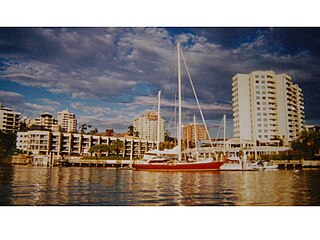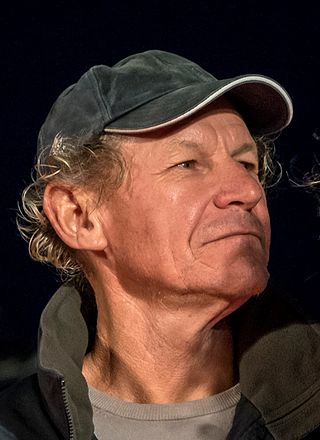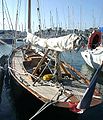
Gaff rig is a sailing rig in which the sail is four-cornered, fore-and-aft rigged, controlled at its peak and, usually, its entire head by a spar (pole) called the gaff. Because of the size and shape of the sail, a gaff rig will have running backstays rather than permanent backstays.
The Single-handed Trans-Atlantic Race (STAR) is an east-to-west yacht race across the North Atlantic. When inaugurated in 1960, it was the first single-handed ocean yacht race; it is run from Plymouth in England to Newport, Rhode Island in the United States, and has generally been held on a four yearly basis.

William Fife Jr., also known as William Fife III, was the third generation of a family of Scottish yacht designers and builders. In his time, William Fife designed around 600 yachts, including two contenders for the America's Cup. The Royal Yachting Association was formed in 1875 to standardise rules, and Fife and his rival G.L. Watson, were instrumental in these rule changes. Around one third of Fife's yachts still exist. His last designs were built in 1938.

Éric Marcel Guy Tabarly was a French naval officer and yachtsman. He developed a passion for offshore racing very early on and won several ocean races such as the Ostar in 1964 and 1976, ending English domination in this specialty. Several of his wins broke long standing records. He owed his successes to his exceptional mastery of sailing and of each one of his boats, to both physical and mental stamina and, in some cases, to technological improvements built into his boats. Through his victories, Tabarly inspired an entire generation of ocean racers and contributed to the development of nautical activities in France.

His Majesty's Yacht Britannia was a gaff-rigged cutter built in 1893 for RYS Commodore Albert Edward, Prince of Wales. She served both himself and his son King George V with a long racing career.
Bruce Tweeddale Dalling was a Springbok South African yachtsman, also advocate and farmer, best known for taking second place on elapsed time and first on corrected time for the monohull award in the 1968 Observer Single-Handed Trans-Atlantic Race.

Lulworth is a racing yacht that was built in Southampton in 1920.

Tabarly is the original soundtrack album of the documentary film of the same title. It is composer Yann Tiersen's first soundtrack since 2003's Good Bye Lenin! and first studio album since 2005's Les Retrouvailles. The album was recorded in Ushant and at Qu'en reste-t-il? studio in Paris, mixed at Davout studios in Paris, mastered at Loud Mastering, and released through Virgin Records and EMI France in CD format on 16 July 2008. A special edition consisting of a CD plus an LP record was released through Ici, d'ailleurs... record label.

Cornelis "Conny" van Rietschoten was a Dutch yacht skipper who was the only skipper to win the Whitbread Round the World Race twice.

Condor of Bermuda is a maxi yacht campaigning under the leadership and funding of London-based international businessman Bob Bell. Originally called Condor but renamed Heath's Condor for the 1977–78 Whitbread Round the World Race after Bell's association with Heath's Insurance Co (London). There is no link with former British prime minister Edward Heath of Morning Cloud yachting fame. Condor was then later renamed Condor of Bermuda, as government policy in the UK during the 1970s effectively exiled the financing of such a campaign by making the funding and domiciling of such an endeavour from the home countries a practical impossibility.
The Blue Water Medal is an honor awarded annually by the Cruising Club of America for a remarkable sailing feat. The first award was issued in 1923.

Marc Pajot is a French sailor. He has been a crew member on Éric Tabarly’s boats.

Manureva was a custom-built racing trimaran famous for being the first oceangoing multihull racing sailboat, opening the path to the supremacy in speed of this kind of boat over monohulls. She won the 1972 Single-Handed Trans-Atlantic Race, skippered by Alain Colas, and was lost at sea with Colas during the first "Route du Rhum" transatlantic solo race in 1978.

Alain Colas was a French sailor, the first to complete a solitary round-the-world race in a multihull. He met Éric Tabarly in Sydney in 1967, and bought Pen Duick IV from him in 1970, and won the "Transat" in 1972. The same year, he started the construction of a 72m 4-masted monohull for the 1976 "Transat".

The Swan 65 is a large fibreglass fin+keeled masthead ketch- or sloop-rigged sailing yacht design, manufactured by Nautor's Swan. It was introduced as the new flagship of Nautor in 1973. At the time of its launch it was the largest glass reinforced plastic (GRP) constructed yacht in the market and because of its excellent racing history, one of the most famous Swan models ever built. The first 65-footers were delivered to owners in 1973, and the production continued until 1989 with 41 hulls built in total.
The following outline is provided as an overview of and topical guide to sailing:
Captain John Holden Illingworth was an English naval engineer in the Royal Navy who achieved fame as a yacht racer and yacht designer. Described on his death as "the father of post-war offshore sailing racing", he held most of the senior positions in British yachting and pioneered several innovations in the sport.

Philippe Poupon, is a French professional offshore yachtsman, born on 23 October 1954 in Quimper, France. He competed in the 1989–1990 Vendée Globe where he was rescued by Loick Peyron. He then went on to finish 3rd in the 1992–1993 Vendée Globe which is the pinnacle solo round-the-world race. He is one of the most successful sailors with three Figaro wins to his credit, winner of the Ostar, the Route du Rhum, the Route of Discovery, the record of the Atlantic. His early experience was as crew for Eric Tabarly onboard Pen Duick VI for the 1977–1978 Whitbread Round the World Race. Since 2009 he has embarked on his boat Fleur Australe on an expedition aimed at raising public awareness of the protection of the oceans.
Marie Tabarly is a French professional yacht sailor based in Lorient, France, in Brittany. She is the daughter of Éric Tabarly, who died while sailing in the Irish Sea in 1998. Marie originally had a career as an equine behaviourist but put it on hold after her horse got injured and decided to focus on sailing instead. She has a long history of sailing many different yachts from a young age, such as Geronimo, the French trimaran which has broken many records, such as with Olivier de Kersauson, for which she was named the godmother at its christening.
The Ocean Globe Race (OGR) 2023 is the 50th-anniversary celebration of the original Whitbread Round the World Race (WRTWR), the first fully crewed round-the-world race in 1973. It was founded by Australian adventurer and circumnavigator, Don McIntyre. It features yachts similar to those used at that time. Except for safety equipment, no modern technology is allowed. The Ocean Globe Race (OGR) set sail with 14 teams on September 10, 2023, from Ocean Village in Southampton (UK), to circumnavigate the globe with 3 stopovers: Cape Town, Auckland, and rounding Cape Horn, Punta del Este (Uruguay), before returning to Cowes in April 2024.

















